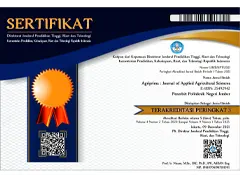Perbedaan Warna Cahaya Lampu LED dan Unsur Molibdenum terhadap Kandungan Antosianin Selada Merah (Lactuca Sativa Var. Crispa)
DOI:
10.25047/agriprima.v8i1.526Downloads
Abstract
Selada merah merupakan sayuran berdaun merah, mengandung antosianin sebagai sumber antioksidan serta bermanfaat bagi kesehatan. Selada merah kaya antosianin menjadi sayur yang menyehatkan, dimana kandungannya dapat ditingkatkan melalui cekaman abiotik, sehingga akumulasi antosianin pada daun lebih tinggi. Penelitian ini memodifikasi kualitas cahaya dengan memberikan warna cahaya lampu LED (merah, kuning, hijau dan biru) dan variasi konsentrasi media dengan penambahan molybdenum (0; 0,01; 0,02; 0,03 mg/L). Hasil penelitan menunjukkan bahwa paparan warna lampu LED biru dan merah menyebabkan meningkatnya kandungan antosianin dan klorofil pada semua media tanaman yang mengandung molibdnum (Mo)., dan sebaliknya dengan peberian paparan warna kuning dan hijau. Kombinasi paparan cahaya lampu LED warna biru dan 0,03 mg/L Mo mampu meningkatkan kandungan antosianin pada daun selada merah mencapai 676,22 µg/g berat segar daun, sehingga dapat digunakan sebagai acuan dalam meningkatkan kualitas selada merah dengan pemilihan warna cahaya dan media tanaman yang optimal.
Keywords:
Antosianin LED Molibdenum Selada MerahReferences
Alappat, B.; Alappat, J. Anthocyanin pigments: Beyond aesthetics. Molecules 2020, 25, 5500.
Chen, C. C., M. Y. Huang, K. H. Lin, S. L. Wong, W. D. Huang, W. D. Huang and C. M. Yang. 2014. Effects of Light Quality on the Growth, Development and Metabolism of Rice Seedlings (Oryza sativa L.). Res. J. Biotech., 9(4) : 15-24.
Hale, K. L., S. P. McGrath, E. Lombi, S. M. Stack, N. Terry, I. J. Pickering, G. N. George and E. A.H. Pilon-Smits. 2001. Molybdenum Sequestration in Brassica Species A Role for Anthocyanins?. Plant Physiology, 126 :1391–1402.
Haryanti, S. 2010. Respon Pertumbuhan Jumlah dan Luas Daun Nilam (Pogostemon cablin Benth) pada Tingkat Naungan yang Berbeda. Buletin Anatomi dan Fisiologi, 18(1) : 20-26.
Kachout, S. S., A. B. Mansoura, J. C. Leclerc, Z. Ouerghi and N. K. Bouraoui. 2015. Effect of Metal Toxicity on Growth and Pigment Contents of Annual Halophyte (A. hortensis and A. rosea). Int. J. Environ. Res., 9(2) : 613-620.
Kumchai, J., J. Z. Huang, C. Y. Lee, F. C. Chen and S. W. Chin. 2013. Proline Partially Overcomes Excess Molybdenum Toxicity in Cabbage Seedlings Grown in Vitro. Genetics and Molecular Research,12 (4): 5589-5601.
Lakitan, B. 2013.Dasar-Dasar Fisiologi Tumbuhan.Jakarta : Raja Grafindo Persada.
Lee, J., R. W. Durst and R. E. Wrolstad. 2005. Determination of Total Monomeric Anthocyanin Pigment Content of Fruit Juices, Beverages, Natural Colorants, and Wines by the pH Differential Method: Collaborative Study. AOAC International, 88(5) : 1269-1278.
Li, Q. and C. Kubota. 2009. Effects of Supplemental Light Quality on Growth and Phytochemicals of Baby Leaf Lettuce. Environmental and Experiment Botany, 67: 59–64.
Mannino, G.; Perrone, A.; Campobenedetto, C.; Schittone, A. Phytochemical profile and antioxidative properties of Plinia trunciflora fruits: A new source of nutraceuticals. Food Chem. 2020, 307, 125515.
Mardhiana, F., S. Soeparjono, T. Handoyo. 2018. Pengaruh Konsentrasi dan Waktu Aplikasi NaCl terhadap Hasil dan Mutu Cabai Merah (Capsicum Annum L.). Agriprima (2) 1:1-8.
Mendel, R.R. & R. Hansch. 2002. Molybdoenzymes and Molybdenum Cofactor in Plants. J. Exp. Botany, 53:1689 – 1698.
Miao, L., Y. Zhang, X. Yang, J. Xiao, H. Zhang, Z. Zhang, Y. Wang and G. Jiang. 2016. Colored Light-Quality Selective Plastic Films Affect Anthocyanin Content, Enzyme Activities, and The Expression of Flavonoid Genes in Strawberry (Fragaria Ananassa) Fruit. Food Chemistry, (207) : 93–100.
Mizuno, T., W. Amaki & H. Watanabe. 2011. Effects of Monochromatic Light Iradiation by LED on The Growth and Anthocyanin Contents in Leaves of Cabbage Seedlings. Acta Horticulturae, 907: 179–184.
Newman, D.J.; Cragg, G.M. Natural products as sources of new drugs over the nearly four decades from 01/1981 to 09/2019. J. Nat. Prod. 2020, 83, 770–803.
Ozarowski, M.; Karpi ´nski, T.M.; Szulc, M.; Wielgus, K.; Kujawski, R.; Wolski, H.; Seremak-Mrozikiewicz, A. Plant phenolics and ˙ extracts in animal models of preeclampsia and clinical trials—Review of perspectives for novel therapies. Pharmaceuticals 2021, 14, 269.
Rao, K. V. M., A. S. Raghavendra & K. J. Reddy. 2006. Physiology and Molecular Biology of Stress Tolerance in Plants. Netherlands: Springer.
Ritenour, M. & H. Khemira. 1997. Red Color Development of Apple: A Literature Review. Tree Fruit Research and Extension Center. Washington State University.
Samuoliene, G., A. Brazaityte, A. Urbonaviciute, G. Sabajeviene & P. Duchovskis. 2010. The Effect of Red and Blue Light Component on The Growth and Development of Frigo Strawberries. Zemdirbyste Agriculture, 97(2) : 99-104.
Stroud, J. L., F. J. Zhao, P. Buchner, F. Shinmachi, S. P. McGrath, J. Abecassis, M. J. Hawkesford and P. R. Shewry. 2010. Impacts of Sulphur Nutrition on Selenium and Molybdenum Concentrations in Wheat Grain. Cereal Science, (52): 111-113.
License
Copyright (c) 2023 Tri Handoyo, SP., Ph.D (Author)

This work is licensed under a Creative Commons Attribution-ShareAlike 4.0 International License.
You are free to:
- Share — copy and redistribute the material in any medium or format.
- Adapt — remix, transform, and build upon the material for any purpose, even commercially.
Under the following terms:
- Attribution — You must give appropriate credit, provide a link to the license, and indicate if changes were made. You may do so in any reasonable manner, but not in any way that suggests the licensor endorses you or your use.
- ShareAlike — If you remix, transform, or build upon the material, you must distribute your contributions under the same license as the original.
- No additional restrictions — You may not apply legal terms or technological measures that legally restrict others from doing anything the license permits.









